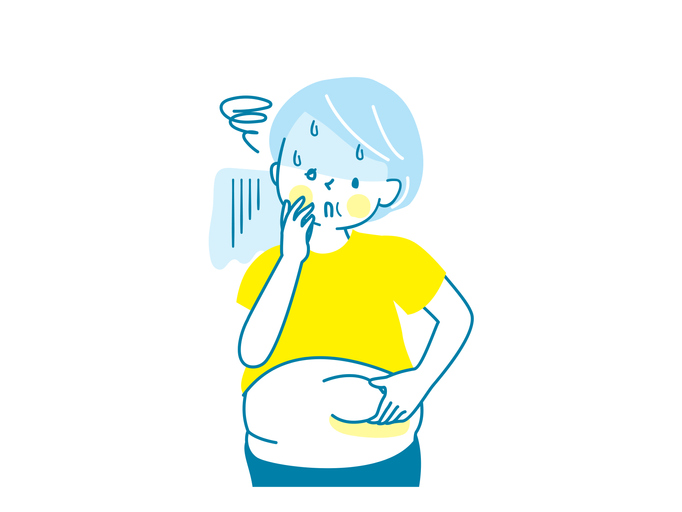Let’s Change the Narrative About Menopause by Being Proactive!

By Joy Stephenson-Laws, JD, Founder
Menopause is not usually a fun topic for many women. And menopausal weight gain? Even worse! I want to, however, flip the script and celebrate menopause.
It is a natural transition bestowed upon women who are fortunate to grow older. Although there can be some pretty unpleasant symptoms such as hot flashes, vaginal dryness, mood changes as well as gaining that menopause muffin top, there is still much we can do to be proactive and increase the likelihood of a smoother transition through menopause and happy, healthy longevity.
The Menopause Muffin Top.
I have previously blogged about this.
“The decrease in estrogen and progesterone, along with aging in general, triggers metabolic changes in the body. One change is a decrease in muscle mass, resulting in fewer calories being burned. If fewer calories are being burned, fat accumulates,” according to UChicago Medicine.
“The muscle tone lost from reduced hormone production is often replaced by fatty tissue deposits. The areas where muscle is usually lost is around the midsection, so that’s where the fatty tissue goes.”
Fat around the belly (also called visceral fat) is considered the most dangerous kind, because it may increase risk of developing fatty liver disease, type 2 diabetes, heart disease and more.
One recent study found evidence that suggested menopause increases the risk of metabolic syndrome.
(Metabolic syndrome is not a disease in itself. In a nutshell, individuals with metabolic syndrome have certain conditions that put them at risk for health problems such as diabetes, heart disease and stroke. Having these conditions may also increase the risk of developing dementia and other cognitive issues. One source refers to individuals with metabolic syndrome as having the “perfect storm” for some serious health issues).
The study mentioned earlier analyzed more than 10,000 women (ages 45 to 85) and found evidence suggesting that menopause increases the risk of developing metabolic syndrome.
We Can Be Proactive.I highly recommend committing to a weight training routine. I actually cannot stress the importance of this enough. This is because “...menopause isn’t the only culprit behind midlife spread: From age 30 onward, all adults lose three to eight per cent of their muscle mass each decade. Menopause just accelerates this decline, which impacts metabolism-—and by extension weight-—because muscle uses calories more efficiently than fat,” according to an article from Chatelaine.
Be Motivated by Your Heart.I know it is so easy to become fixated on how you look and the number on the scale, but I believe it’s critical to focus on less superficial motivators. Heart disease is the leading cause of death in both American men and women. This is why being proactive about weight gain around the middle during menopause is important.
A Diet Designed for Menopause?
I recently came across an article about the Galveston Diet. I had never heard of this diet before, and I am usually turned off by the word “diet” but I was very curious about this one.
“The latest diet to get in the weight loss game is the Galveston Diet. According to its creators, it was designed to meet the specific health needs of women experiencing perimenopause and menopause,” according to the article referenced earlier.
Apparently, this diet was created by an OB/GYN named Dr. Claire Haver. Through seeing and examining so many female patients throughout different stages in their lives, Dr. Haver received quite a lot of knowledge about women struggling with weight gain during menopause. She then experienced the weight gain struggle herself as she started to go through the transition.
The Galveston Diet is supposed to help combat those hormone changes that occur during menopause, addressing weight gain and other menopausal symptoms.
“Many diets focus on reducing calories and increasing physical activity. While this can be an effective way to lose weight, it doesn’t address the conditions that cause weight gain during menopause, like hormone changes and fluctuations. Additionally, because calorie restriction can be quite punishing, it may feel like you’re avoiding your favorite foods, only to see little or no results.”
I love the concept of not being too restrictive!
“Instead, the Galveston Diet inventories the foods you eat and assesses the quality and quantity needed for your overall health and wellness during perimenopause and menopause. Put another way, it’s about the nutrients and anti-inflammatory benefits found in the right foods.”
I like this even more. No matter our age or sex, we should all be focusing on having a high intake of nutrients (particularly vitamins and minerals) and foods that fight inflammation such as nutrient-dense fruits and vegetables. Chronic inflammation is essentially believed to be the root cause of many diseases Americans face. The Galveston Diet encourages avoiding foods that promote inflammation such as nutrient-void processed and ultra-processed foods.
There Are Also Three Pillars to the Galveston Diet.- Intermittent fasting. I have blogged a lot about fasting and the different ways to approach it. The Galveston Diet recommends implementing an eight-hour eating window, also called the 16:8 method (16 hours fasting and eight hours in which you can eat). It is important to stress that fasting does not mean you can eat whatever you want or consume a surplus of calories during the eating window.
- Eating anti-inflammatory foods. To get an idea of what an anti-inflammatory diet looks like, read here. Always strive to ‘eat the rainbow,’ so plenty of colorful fruits and veggies. I try to eat plenty of greens and then at least five other colors from bell peppers, beets, carrots, blueberries and purple sweet potatoes.
- ‘Fueling Refocus.’ “Using a tracker, you’ll count your macronutrients, giving you a better sense of the proteins, fat, and carbohydrates you consume in order to assist with meal planning. While this bears some similarities to the keto diet, it’s important to remember that the Galveston Diet isn’t about restricting or counting calories at any stage,” according to the article mentioned earlier. There are apps that can easily help with tracking those macros.
This diet also recommends drinking plenty of water and limiting intake of alcohol. I definitely agree with this, especially because alcohol promotes inflammation and dehydrates and depletes the body of nutrients. If you are battling menopause weight gain, perhaps the Galveston Diet is something you should consider, however, not without the guidance of your doctor or a competent healthcare professional. It is especially important to seek professional advice when implementing a routine that involves fasting.
As you age, it may be more challenging for your body to absorb certain nutrients. Getting a nutritional test is key in ensuring your body has adequate amounts of essential vitamins, minerals, protein and other nutrients. Deficiencies in critical nutrients may hinder weight loss despite your good efforts. If you have any deficiencies, you can work with your healthcare provider on tweaking your diet and maybe even taking good quality supplements.
I think it’s also important to acknowledge that women do not have to wait for a problem to occur or even wait until they are middle age to start being proactive. Menopause is a transition that can take years. So the healthier you are before menopause, the better. You also want to avoid those things that can put you into menopause at a younger age. Being overweight and a smoker are two things that can make you experience menopause earlier and, of course, increase the risk of developing metabolic syndrome.
Finally, I recommend checking out these two pH Labs blogs:
- Minerals and Hormonal Balance: Meet Joy Stephenson-Laws
- What To Do When Midlife Weight Gain Kicks In
Enjoy your healthy life!
Disclaimer: This article is not intended to provide medical advice. Please consult with your doctor or another competent healthcare practitioner to get specific medical advice for your situation.
The pH professional health care team includes recognized experts from a variety of health care and related disciplines, including physicians, attorneys, nutritionists, nurses, and certified fitness instructors. This team also includes the members of the pH Medical Advisory Board, which constantly monitors all pH programs, products, and services. To learn more about the pH Medical Advisory Board, click here.







